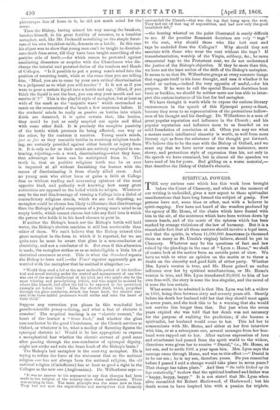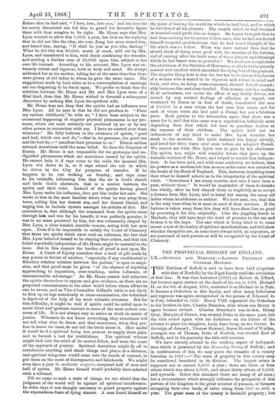SPIRITUAL POWERS.
THE very curious case which has this week been brought before the Court of Chancery, and which at the moment of our writing is undecided, gives a new aspect to those spiritualist manifestations that have long formed the subject of gossip. Few persons have not, some time or other, met with a believer in spirit-rapping. Few have not heard of the wonders produced by the agency of Mr. Home, of the chairs which have floated with him in the air, of the sentences which have been written down by unseen hands, and of the music of the spheres which has been marked by strange violations of the law of harmony. But it is a remarkable fact that all these matters should involve a legal issue, and that the spirits, in whom 11,000,000 Americans (a thousand times as many as St. Ursula's virgins) believe, should be put in Chancery. Whatever may be the questions of fact and law raised by the pleadings in the case of " Lyon v. Home," we shall of course look at the matter from an outside point of view. We have no wish to utter an opinion on the merits or to throw a doubt on the sincerity and good faith of either party. Whether Mrs. Lyon's version is true, and Mr. Home gained an undue influence over her by spiritual manifestations, or Mr. Home's version is true, and Mrs. Lyon transferred 30,0001. to him of her own free-will, the story is none the less singular, and the moral of it none the less certain.
What seems to be admitted is that Mrs. Lyon was left a widow in 1859, being then between sixty and seventy years old. Shortly before his death her husband told her that they should meet again in seven years, and she took this to be a warning that she would not survive him longer than that. But just when the seven years expired she was told that her death was not necessary for the purpose of realizing the prediction; if she became a spiritualist, her husband would come to her. This led her to communicate with Mr. Home, and either at her first interview with him, or at a subsequent one, several messages from her hus- band were rapped out to her. After various expressions of love and attachment had passed from the spirit world to the widow, directions were given her to receive " Daniel," i.e., Mr. Home, as her son, and to settle 7001. a year upon him. Mrs. Lyon says the message came through Home, and was to this effect :—" Daniel is to be our son ; he is my son, therefore yours. Do you remember before I passed I said a change would take place in seven years? That change has taken place." And then " the table kicked up its legs ecstatically," to show that the spiritual husband and father was " happy, happy, happy." It is not stated that Mr. Lyon when alive resembled Sir Robert Hazlewood, of Hazlewood ; but his death seems to have inspired him with a passion for triplets.
Before that he had said, " I love, love, love you," and his love for his newly discovered son led him to guard his favourite figure three with four noughts to its right. Mr. Home says that Mrs. Lyon wanted to allow him 1,0001. a year, but that on his replying that he did not like the idea, she rose, flung her arms round him, and kissed him, saying, "It shall be just as you like, darling !" What he did like was 30,0001. worth of stock, sold out by Mrs. Lyon, and transferred to him, with deeds confirming the transfer, and settling a further sum of 30,000/. upon him, subject to her -own life interest. According to his account, Mrs. Lyon was ex- tremely robust and vigorous, both in body and mind. He always addressed her as his mother, telling her at the same time that there were plenty of old ladies to whom he gave the same name. The -suggestions made by both sides as to a contemplation of marriage are too disgusting to be dwelt upon. We prefer to think that the -relations between Mr. Home and Mr. and Mrs. Lyon were of a filial kind, than that Mr. Home wished to forestall a subsequent discoverer by making Mrs. Lyon his spiritual wife.
Mr. Home does not deny that the spirits had an influence over Mrs. Lyon. All he says is that he did not produce it. " From any earliest childhood," he tells us, " I have been subject to the .occasional happening of singular physical phenomena in my pre- -Bence, which are most certainly not produced by me or by any .other person in connection with me. I have no control over them whatever." He fully believes in the existence of spirits, " good and bad, which can and do,"—that is, we presume, the good can and the bad do,—" manifest their presence to us." Eleven million rational Americans hold the same belief. So does the Emperor of Russia. Mr. Home is not responsible for the grotesque and un- dignified phenomena which are sometimes caused by the spirits. Ile cannot help it if raps come to the table the moment Mrs. Lyon sits down to it, or if raps attend the cab in which „he drives to the City for purposes of transfer. If he happens to be out walking on Sunday, and raps come to his umbrella informing him that the air is God's church and birds God's choristers, that is a matter between the spirits and their ruler. Instead of the spirits having placed Mrs. Lyon under his influence, they put him under her care. She Tarot() to him in the most familiar strain when he was away from town, calling him her dearest son, and her dearest Daniel, and urging him to include oysters amongst his articles of diet. His • contention is, that although the command from the spirits came • is deprived of the help of his most valuable witnesses. But for this difficulty, it might be well if spirits could be called upon to -assist blind and ignorant mortals in some of the most serious con- cerns of life. It is not always easy to arrive at truth in courts of justice. Witnesses do not know everything, they sometimes will not tell what they do know, and they sometimes, when they pro- fess to know the most, do not tell the truth about it. How useful it would be if a spiritual being was present to supply these gaps, and to furnish a test for truthfulness. The spiritual witness might look into the mind of its mortal fellow, and warn the court .of the approach of perjury. Spiritual detectives might fly off to corroborate anything said about things and places at a distance, and spiritual telegrams would come into the hands of counsel, to put them on the scent of discrepancies and falsehoods. We might even have a jury de medietate corporis, composed half of men and half of spirits. Mr. Home himself would probably have selected such a tribunal. Till we come to such a state of things, we are afraid that the judgment of the world will be against all spiritual interference. In olden days it was thought necessary to guard property against the superstitious fears of dying sinners. A man found himself on the point of leaving the world for which he had lived, and in which he had found all his pleasure. The wealth which he had lavished or hoarded could profit him no longer. He began to regret that ho had done nothing for his poorer fellow-men, that he had not denied himself temporal gratifications, that he had never thought of the life which was to follow. What was more natural than that he should think of doing some good with the remains of his fortune, and of earning after his death some of those prayers and blessings which he had heard were so powerful ? We need not recapitulate the provisions of the Statutes of Mortmain, or allude to the priestly counsel and comfort which smoothed the dying bed of the penitent. The singular thing here is that the law has to be invoked in favour of a woman who is stated to be vigorous and robust in mind and body, and who, on being cross-examined, showed herself remark- ably business-like and clear-headed. This woman, not in a sudden fit of enthusiasm, not under the effect of any bodily duress, not moved by any natural feelings of affection or regard, not weakened by illness or in fear of death, transferred the sum of 30,000/. to a man whom she had seen four times, and for each of whose visits she had paid a liberal, but not a fabulous price. Both parties to the transaction agree that there was a cause for it, and that this cause was a superstition infinitely more degrading than that which led men to purchase heaven at the expense of their children. The spirits held out no inducement of any kind to make Mrs. Lyon transfer her stock to the medium. Her spirit husband was happy already, and loved her three times over even before she adopted Daniel. We cannot see what Mrs. Lyon was to gain by her obedience. The spirits, too, might well consider before they gave up the valuable services of Mr. Home, and helped to render him indepen- dent. It has been said, and with some authority we believe, that his powers as a medium left him as soon as his name was entered in the books of the Bank of England. This, however, is nothing more than what he himself admits as to the irregularity of the spiritual visits. " Sometimes I am many months, and once I have been a year, without them." It would be ungrateful of them to forsake him wholly, after he had obeyed them so implicitly as to accept a fortune from Mrs. Lyon, and to instal her among the many old ladies whom he addresses as mother. We have seen, too, that this is the very time when he is most in need of their services. If the fortune is taken away from him they will have done him no good by procuring it for him originally. Like the juggling fiends in Macbeth, they will have kept the word of promise to the ear and broken it to the hope. The case which is being tried is to some extent a test of the reality of spiritual manifestations, and will show whether the spirits are, as some have always held, an imposture, or are possessed of such powers as will be recognized by the Court Of Chancery.



































 Previous page
Previous page